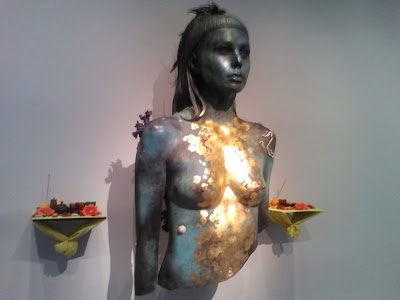Wrinkly Film Club* 16/11/17: Ruth & Alex
Having pretty much run out of DVDs in my possession that my
care home pals will comfortably watch, I have begun using rentals. I found Ruth & Alex / 5 Flights Up (dir. Richard
Loncraine, 2014) while browsing the modest (and largely adult) collection in my
local library. The film’s affectionate depiction of an ageing couple played by
Diane Keaton and Morgan Freeman facing having to move from their Manhattan
apartment after 40 years because the stairs have become a struggle was up our
alley.
I’m always on the lookout for films concerning well-developed older characters. Ideas for these are plentiful, but I’m working
some limitations pose challenges. Some residents are at
various stages of dementia, so I need films gentle enough for them to follow,
meaning uncomplicated linear plots and narratives, clear English diction, subtitles
for the hard of hearing, and nothing too suspenseful or racy. I also must
factor in the regulars whose minds are sharp and hungry for good stories, and who need a break from the incessant quiz and auction shows blasting from the
telly box day in, day out.
Animation, even when realist and universal, has not
gone well, and I haven’t felt brave enough to try again. Contemporary films
have worked fine as the images are clear, and colour seems to be easier to cope
with and to follow who’s who. Historical dramas have proved the most popular. Belle (dir. Amma Asante, 2013) had about
the biggest, most gripped audience and, along with Mrs Brown (dir. John Madden, 1997), the most positive response so far.
Ruth & Alex was
a punt that worked okay. Two of the ladies enjoyed it very much and are fans of
Morgan Freeman. One had lived in Washington DC in the 1960s and mentioned that
she didn’t like New York as much as DC. It seemed to take her back to a happy
time in her life, though. Their praise and thanks for my good choice (their
words) was heartening. I suspect it was to balance the negativity coming from a
regularly dissatisfied contingent.
The woman in question makes loud disparaging remarks and
talks through chunks of the film when she’s not enjoying it. It’s a shame
because it disrupts the others who are giving it a go and even enjoying it. But
who am I to shush people in their 80s and 90s? She’s pleasant to my face but
it’s the kind of passive aggressive politeness that is laced with disdain. To
be honest, there are weeks when I dread going because of this one person, but
the others make it worthwhile and appreciate that I do this voluntarily and am
trying my best in a situation in which you simply can’t please everybody.
The film was charming. At times it was a bit too ‘talky’ for
me, and I always have issues empathizing with middle class problems. However, Ruth & Alex is punctuated with
flashbacks of the couple’s struggles in their early years, indicating the
prejudice they rose above in the 1970s and the condescension they face daily as
elderly people.
A sub-story about a suspected ‘Muslim terrorist’ affecting
their part of town and the tangential events connected to this subtly suggests
that the US’s problems perhaps lie with unfounded white anxiety fuelled by
sensationalized news reportage. It indicates through a range of incidental
characters that New York’s diversity is what makes it special. The underpinning
narrative of the distressed man of middle eastern origin being mediatized as a
terrorist threat also highlights the selfishness of the ‘elite’ classes in
showing how they perceive the drama unfolding around him as having a
detrimental effect on the desirability and profitability of the homes they are
selling. The sellers Ruth and Alex look to buy from blame his actions for affecting
the area’s real estate while Alex sees him as a fellow human whose difficulties are being misrepresented for the
sake of ratings on 24-hour live broadcast news. The same couple assume Ruth and Alex
lost their critical faculties some time ago and speak disparagingly about
them – not to them – in their presence. Given that Ruth and Alex's life experiences have been centralized until this late stage of the film, this assumption is clearly shallow and ignorant.
The film is solidly made with clean, conventional aesthetics
and the most beautiful, lovingly filmed aerial/drone shot of Manhattan providing
a backdrop to the closing credits accompanied by Van Morrison’s ‘Have I Told
You Lately’. I thought it was heart-warming, and not trite or too schmaltzy
(not that schmaltz is negative). It made me feel pleased that Diane Keaton is
still so relevant to New York film production 40 years after Annie Hall. That two of the residents
enjoyed it so much made it worthwhile, and I’d recommend giving it a go.
*I run a weekly film
club at The Grove Abbeyfield Residential Care Home in Gosforth to provide
intellectual stimulation and a talking point for residents. I sometimes rent or
buy DVDs for this. If you would like to support the club, I would be incredibly
grateful for donations to paypal.me/peablair. Just £1 will fund two films borrowed from
local libraries at 50p each. Thank you.

Comments
Post a Comment